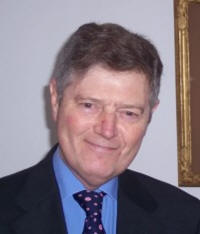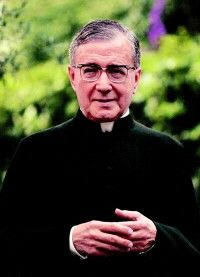Catholic Medical Quarterly Volume 72(2) May 2022
Obituary
Saving the life of the President of Ukraine: Prof John Henry remembered
Dr Adrian Treloar
 John
Henry (1939-2007) was an astoundingly bright and able Professor of
Toxicology in St Mary’s Hospital London. He was a go-to person for the
radio and television on cannabis and the harms it did. He was also a
delightful friend, a very devout Catholic and a numerary in Opus Dei. He
helped bring many of us closer to faith.
John
Henry (1939-2007) was an astoundingly bright and able Professor of
Toxicology in St Mary’s Hospital London. He was a go-to person for the
radio and television on cannabis and the harms it did. He was also a
delightful friend, a very devout Catholic and a numerary in Opus Dei. He
helped bring many of us closer to faith.
He himself, as we shall see, knew St Josemaria Escriva who prayed for John to get a new kidney. John had a delightful smile, was kind and gentle and he told me once about how he had diagnosed and saved the life of the man who would be the Ukrainian President from 2005-2010. In 2004 Viktor Yushchenko was the presidential candidate who was challenging the pro Russian president. A banker with no political experience, he offered an alternative. But he was taken ill following a dinner with the head of Ukraine's state security services.
The mystery illness could not be diagnosed. He developed sores and lumps on his face. Seeing the pictures on television, John was contacted by a journalist while Mr Yushchenko was being treated in a Swiss clinic and John was asked for his opinion. John asked the journalist to obtain pictures. When he saw the pictures John realised that the lumps indicated Dioxin poisoning. He told me that he rang the Ministry of Defence.......and told them this, and they passed on the message. After tests, Yushchenko was confirmed to have ingested hazardous amounts of 2,3,7,8-tetrachlorodibenzodioxin (TCDD), the most potent dioxin and the most important component of “Agent Orange”. He was given the appropriate treatment and survived. The Orange revolution was hugely bolstered by the poisoning which had happened in Kiev.
The Orange revolution was hugely bolstered by Viktor Yuschenko’s poisoning with ‘Agent Orange’
With the rightful authority and respect that came from his job and also his spot diagnosis, he was also asked to diagnose the cause of Alexander Litvenenko’s illness, a Russian defector who had been poisoned on the streets of London. He did less well this time. He thought it was Thallium poisoning although it later turned out that the toxin was polonium-210. He even became a media personality. I heard him on the radio several times and he also did television interviews. On one occasion he was duped into doing the Ali G show. He talked about the dangers of hard drugs, and brushed aside the jokes made at his expense. Such was the man that he told me with fondness and amusement about that episode.
John Henry became a numerary (i.e. celibate) member of Opus Dei as a medical student. But in 1969, while on holiday in Italy, John developed a throat infection which caused kidney failure. Being a medic on dialysis was too hard to do, and so he left medicine for five years. During those years John became director of Netherhall House, a student hall in Hampstead promoted by Opus Dei, where he was the director from 1967 until 1970.
 He
did not greatly like dialysis, and when he met St. Josemaria Escriva in
1972 the future saint prayed fervently that a suitable kidney could be
found. Escrivá died in June 1975 and in May 1976 a kidney was found
meeting John Henry’s needs, after he had prayed to the saint for his
intercession. I recall John telling me that the novena was prayed and, as
I recall, at the end of that Novena nothing happened. So a second Novena
was recommended and on the 9th day, a suitable transplant became
available. This kidney was to give him another 31 years of active life.
He
did not greatly like dialysis, and when he met St. Josemaria Escriva in
1972 the future saint prayed fervently that a suitable kidney could be
found. Escrivá died in June 1975 and in May 1976 a kidney was found
meeting John Henry’s needs, after he had prayed to the saint for his
intercession. I recall John telling me that the novena was prayed and, as
I recall, at the end of that Novena nothing happened. So a second Novena
was recommended and on the 9th day, a suitable transplant became
available. This kidney was to give him another 31 years of active life.
John never doubted in the slightest that his successful transplant in 1976 was the result of Our Lady’s intercession in response to St Josemaria’s intercession.
Armed with a functioning kidney once more, John went onto an illustrious and career of clinical and academic excellence.
But he was also very human and kind. We met after I became a Guy’s medical student in 1978. And he helped me in so many ways too. John Henry spoke naturally and freely about his faith to professional colleagues and students and sought to draw them all closer to Christ. One former student described how she and her colleagues saw him as an inspiration and “icon”. He talked of his faith in a very straightforward manner, without in any way seeking to impose it on others. His easy, even casual manner endeared him to all. He was consistently friendly in his treatment of all, and he frequently used the humorous title “Chief ” to people of every rank. On first meeting junior staff, he would make an effort to remember their first names and surprise them by using it on their next encounter.
Sadly, his kidney failed, and it had to be removed. The operation went well, but he died of haemorrhaging during his recovery period. Prayer works. John clearly attested that as a fact, never doubting that St Josemaria’s prayers and those Novenas had given him the life he so relished.
Sources
- Wikipedia John Henry (toxicologist)
https://en.wikipedia.org/wiki/John_Henry_(toxicologist) - Evans J. Opus Dei. In Memoriam John Henry 1939 to 2007.
https://opusdei.org/en-uk/article/in-memoriam-john-henry-1939-2007/
